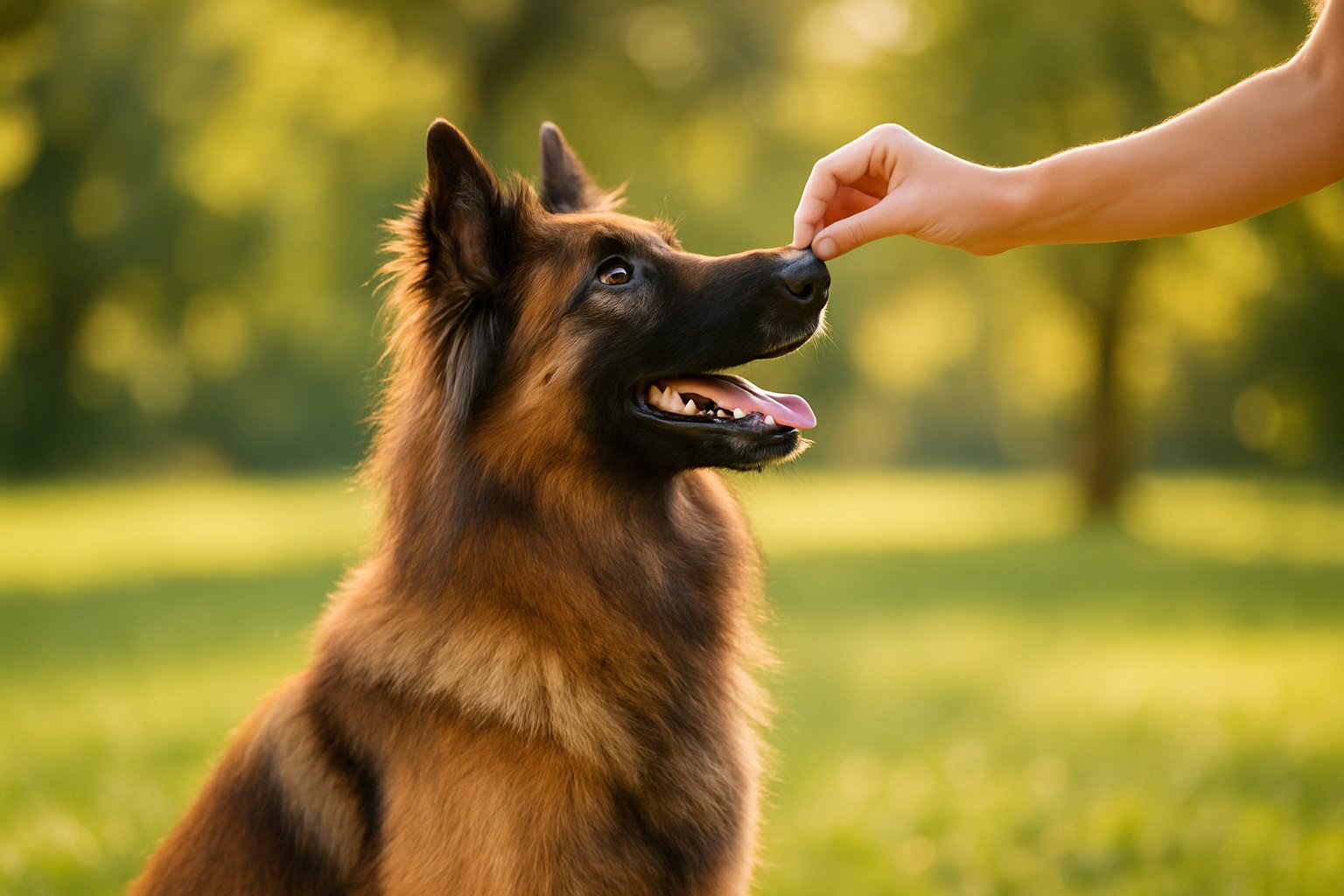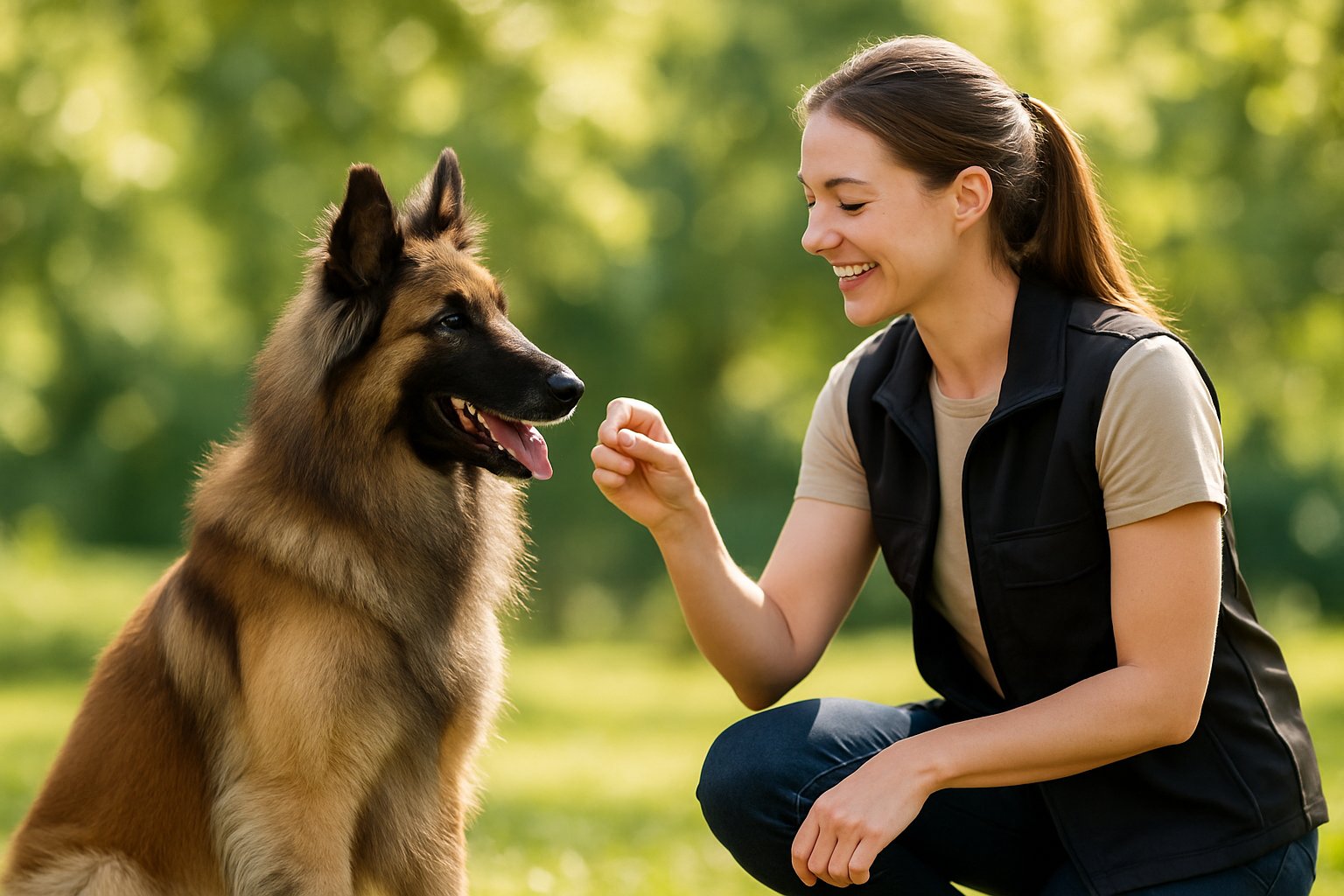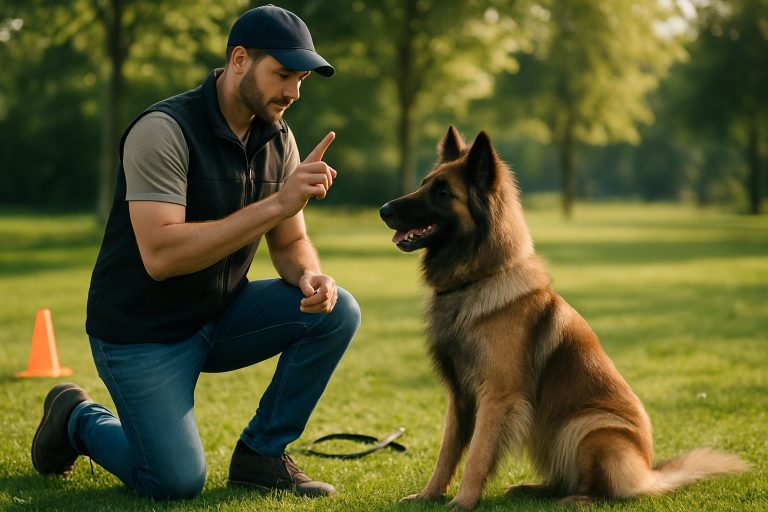Training a Belgian Tervuren takes patience and a smart approach because of their intelligence and energy. This breed learns quickly but needs guidance to stay challenged and happy.
Using the right training tips helps you raise a well-behaved, confident Belgian Tervuren who fits in with your family. You will find simple advice that makes daily training easier and helps your dog reach their potential.
1. Start training early to build a strong foundation and social skills.
- Begin training your Belgian Tervuren as soon as you bring them home. Early training helps your puppy get used to routines and learn the house rules. It’s easier to guide a young dog before unwanted habits develop.
- Puppies learn best with short, positive sessions multiple times each day. Consistency is important. Use the same words and rewards each time so your dog understands what you expect.
- A strong training foundation also supports healthy social skills. Early exposure to new people, other animals, and places teaches your Tervuren to stay calm in different situations. This makes handling your dog in public or at the vet much easier as they grow.
- Giving your puppy chances to interact with others will help prevent fear and unwanted behaviors later. Social skills learned during this critical period lay the groundwork for positive experiences throughout your Belgian Tervuren’s life.
- Early training leads to better focus, stronger bonds, and a more confident dog. Belgian Tervurens are intelligent and thrive on learning, so starting young gives them the best chance to succeed.
2. Use positive reinforcement like treats and praise consistently.
When training your Belgian Tervuren, positive reinforcement works very well. This means you reward your dog right after they do what you want. You should use treats, praise, or both. Dogs respond best when you give rewards every time they get something right. This helps your Tervuren understand exactly which behavior you like. Being clear and quick is important for building good habits.

3. Avoid harsh corrections or physical punishment to maintain trust.
Harsh corrections or physical punishment can damage the bond you are working to build with your Belgian Tervuren. This breed is very intelligent and sensitive to your tone and actions. If you react with anger or use force, your dog may become fearful or anxious. Positive reinforcement is a better way to guide your Belgian Tervuren. This means rewarding good behavior with treats, toys, or praise. Training this way helps your dog feel safe and encourages them to learn.
4. Introduce socialization with other dogs and people from a young age.
- Early socialization is important for Belgian Tervurens. Start introducing your puppy to new people and other dogs as soon as your veterinarian says it’s safe.
- Bring your dog to different places, such as parks or pet stores, to let them experience a range of sights, sounds, and smells. Meeting new people and dogs helps lower the risk of fear or shyness later in life.
- Positive experiences during this time build confidence. Encourage gentle interactions and reward your puppy with treats and praise when they behave calmly around others.
- Puppy training classes are a good way to help your Belgian Tervuren get used to other dogs and people in a controlled setting. Remember that the best time to start socializing is between 3 and 14 weeks of age, but it is possible to teach social skills to older dogs, too.
- Stay patient and consistent. Go at your dog’s pace and avoid forcing them into situations that make them nervous. Repeated exposure to positive interactions will help your Belgian Tervuren become well-adjusted and comfortable in many environments.
5. Incorporate mental exercises to challenge their intelligence.
- Belgian Tervurens are highly intelligent dogs that need regular mental stimulation. Without enough brain challenges, they may become bored, restless, or even develop unwanted behaviors.
- Simple training games, like “find it” or hide-and-seek with treats, are great ways to encourage your dog to think and problem-solve. Puzzle toys and interactive feeders can also keep their minds sharp during mealtime.
- Teaching new tricks, even basic ones like spin or bow, gives your Belgian Tervuren a way to learn and use their intelligence. Switch up training routines often to prevent them from getting too predictable or boring.
- Structured mental exercises have been shown to boost focus, memory, and overall cognitive skills. Try incorporating short training sessions daily as part of your regular routine.
- You can also use brain-training apps for dogs or try advanced obedience and agility exercises to provide extra mental stimulation. Social engagement with other dogs can challenge your dog’s communication and thinking skills as well.
6. Be patient and consistent with training routines daily.
- Belgian Tervurens are smart and eager to learn, but they respond best to regular, steady practice. Training every day helps your dog remember what you have taught and build new skills over time.
- Being patient is important because progress might be slow, especially with complex commands or new behaviors. Expect to repeat lessons several times before your Tervuren truly understands.
- Keep your routines simple and stick to a clear schedule. Dogs feel secure when they know what to expect. Even on busy days, aim for a short session so that training stays part of your dog’s daily life.
- If a session does not go well, stay calm and try again the next day. Your steady approach will help your Belgian Tervuren succeed. Daily, consistent work is key for reaching your dog’s training goals, as experts recommend in consistent training routines.
- Maintaining this habit helps your Tervuren develop good behavior and strengthens your bond. Small rewards and gentle praise can keep your dog motivated and willing to participate.
7. Begin pre-agility training after basic obedience at 3-4 months.
Once your Belgian Tervuren has learned simple commands like sit, stay, and come, you can start pre-agility training. Most puppies are ready for these activities by 3 to 4 months old. Early work helps your pup gain confidence and focus before moving to real agility equipment. Start with activities on flat ground that teach coordination and attention. This can include loose leash walking, simple recalls, and basic targeting games. Tug games and running through simple obstacles, like walking between cones or across ground poles, are also useful.

8. Use crate training to support housebreaking and security.
Crate training is a helpful tool for housebreaking your Belgian Tervuren. Dogs have a natural instinct to avoid soiling their sleeping area, so a crate encourages them to hold their bladder until let outside. This makes it easier to teach your dog where and when to go potty. Choose a crate that is big enough for your Belgian Tervuren to stand up, turn around, and lie down comfortably. Too much space may allow the dog to have accidents in one corner and sleep in another. A correctly sized crate builds the habits you want.


